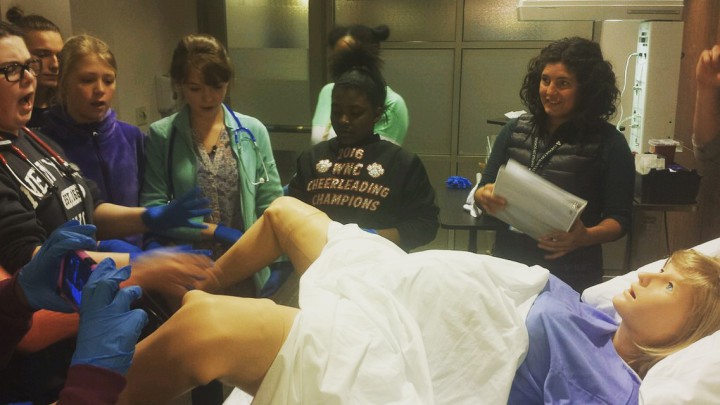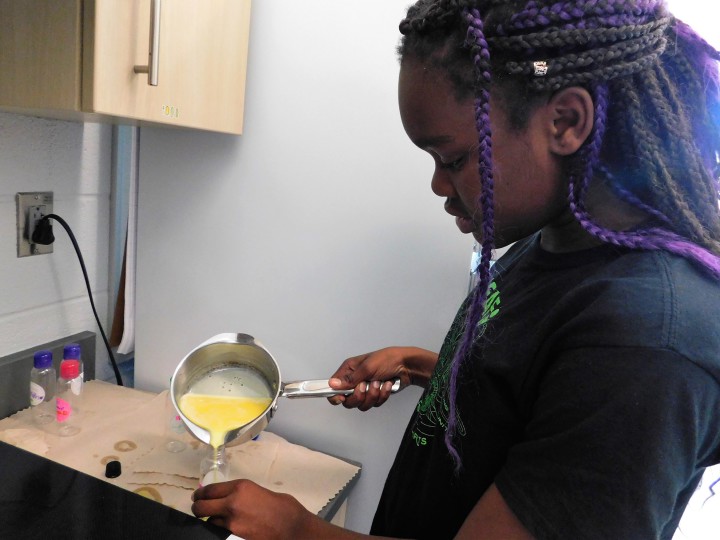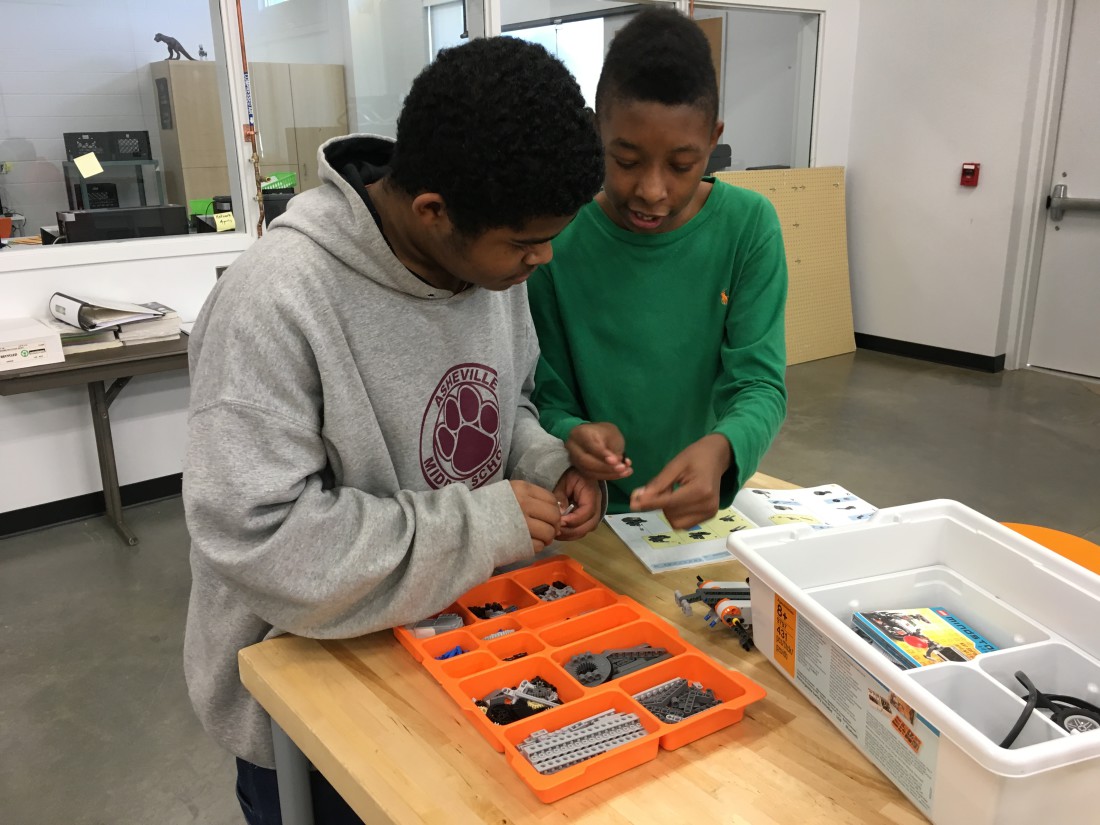When life began to unravel for Melanie Lee Whitney, she did her best to keep her family together and provide for her six children.
But the family landed in a neighborhood that’s plagued by violence, and Whitney began to wonder how she could enrich her children’s lives when they had little access to arts and culture, or even to fresh air after school.
It was an after-school program at Asheville Middle School that got her children engaged in activities like Latin dance, making their own cosmetics and exploring careers in engineering and medicine.
Joseph Whitney, 13, has discovered the joy of creating pottery; his twin brother, Robert, brought his silly side to the fore with Circus Arts.
The program serves some 250 students at Asheville Middle School, partnering with businesses, nonprofits and volunteers to offer a wide variety of after-school experiences, ranging from health care to arts and fitness.
The program began a decade ago, as the city experienced an increase in juvenile crime. The nonprofit Asheville City Schools Foundation began a yearlong listening project in 2007 to address the issue, says Kate Pett, a former teacher and executive director of the foundation.
One unidentified student told the foundation, “If you don’t have something to do, you’ll find something to do, and it will be the wrong thing.”
Gene Bell, who was on the Board of Education when the process began, thinks it is illogical to lock the doors of a school after classes let out.
“It just doesn’t make sense to have a facility like this sit empty,” he says.

What grew from the listening project is Lights On After School: In Real Life, better known as IRL, a program to engage middle school students based on the Providence [R.I.] After School Alliance. It offers students dozens of choices, allowing them to explore new interests or pursue existing passions, and everyone gets a healthy snack and transportation to and from programs that take place off-site.
The cost of Asheville’s program is about $200,000 a year for the 250 students, less than the average cost of $1,000 to $2,000 per student in such programs nationally, Pett says.
According to Austin Napper of the foundation, about 25 percent of program participants are students of color, and over 55 percent live in poverty. The program, he says, fills many gaps in providing after-school care and enrichment for lower-income families, since “its already reasonable $7-per-day program fee slides all the way down to 50 cents per day.”
Without IRL, Joseph Whitney admits he might be doing homework, or he might be playing video games.
Joseph’s sister, Abby, 12, participates in Iron Girls, a CrossFit program that uses weightlifting and gymnastics to help girls improve their self-image and gain strength both physically and emotionally.
“It empowers us to acknowledge our inner strength,” Abby Whitney told a group of about 50 community members who attended a recent tour at the middle school.
A program developed by third-year MAHEC family medicine resident Lateef Cannon allows students to get some small experience in medical careers. At one session, a very expensive android announces she is about to give birth as the students enter the room, and students get to assist in a simulated delivery.
“We see some pretty surprised looks on their faces,” Cannon says. “We also let them use an ultrasound machine to try and identify objects in gelatin.”

Down the hall, Kristen Kirby, who is with the Girl Scouts, conducts the Natural Beauty class, where Danielle Taylor, 12 is making sunscreen and a bracelet with beads that change color when exposed to sunlight.
“Say you want to have a job making these products,” she says. “Now I know what goes into them, and it’s more fun than being on the computer.”
IRL seeks to engage students in a social-emotional learning experience, says co-director Brian Randall, who the day before the public event, spent the afternoon monitoring a baking competition between two teams of middle school boys, who had to make one sweet and one savory pastry. The result was some burned “s’more biscuits” and something to do with hot dogs. The photos weren’t completely clear, although Randall says the pastries were tastier than they appeared in the photos.
The important thing about the competition was that the students split into teams and chose leaders.
“They had to figure out how to listen to each other and work together,” Randall says. “They had to resolve conflicts and make decisions. … It enhances what they’re learning in school, but with a hands-on approach.”
The rules of IRL are simple: Show up, be kind and be engaged.
The focus of the programs is on what Randall calls The Big Four: emotion management, teamwork/social awareness, empathy and decision-making.
But as much as students are expected to treat the people who offer the programs with respect, the students get respect in return.
And surveys of the students show they appreciate the effort put into IRL: 89 percent reported they had fun, 80 percent said they felt loved, and 96 percent said they felt safe. About two-thirds of participants rated the programs in which they participated as five stars.
The programs are as varied as the students and include yoga, debate, running, hip-hop and street dance, a farm-to-table program that helps students understand how to start a garden and source foods locally, theater and cooking. A parks and recreation program at the Montford Community Center allows students to try a variety of outdoor activities, including climbing, disc golf, archery, biking and more.
In all, some 98 programs are offered with the help of dozens of community partners, including the United Way of Asheville-Buncombe County, Duke Energy, MAHEC, The Grove Park Inn, The Collider, Sisters of Mercy, the YMCA, Thermo Fisher Scientific and the city of Asheville.
Whitney says she appreciates how her children’s lives are being enriched by IRL.
“Latin dance is not something my kids do at home,” she says. “And Joseph would never have known how much he enjoys working with his hands because he was always in a book, and we didn’t have the materials to allow him to try making pottery at home. … It expands their knowledge and experience.”




Before you comment
The comments section is here to provide a platform for civil dialogue on the issues we face together as a local community. Xpress is committed to offering this platform for all voices, but when the tone of the discussion gets nasty or strays off topic, we believe many people choose not to participate. Xpress editors are determined to moderate comments to ensure a constructive interchange is maintained. All comments judged not to be in keeping with the spirit of civil discourse will be removed and repeat violators will be banned. See here for our terms of service. Thank you for being part of this effort to promote respectful discussion.